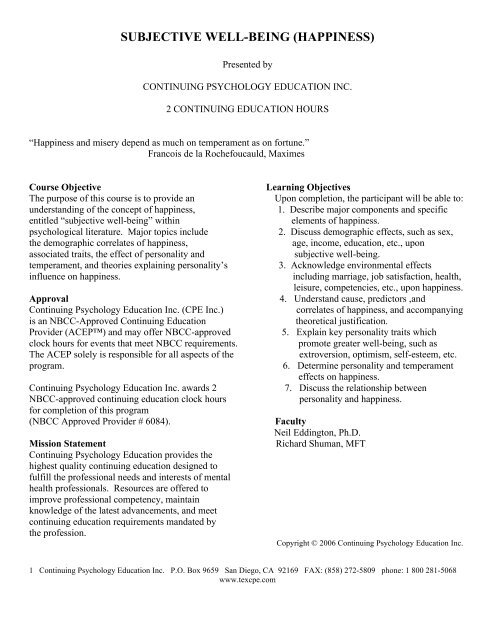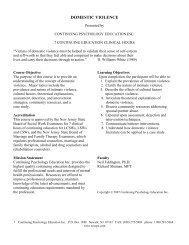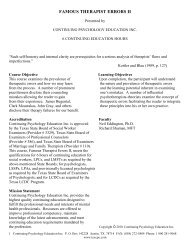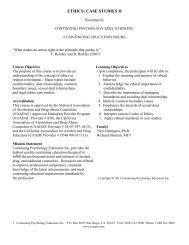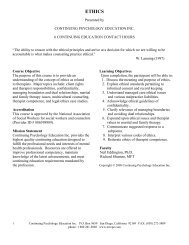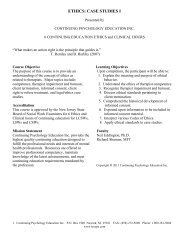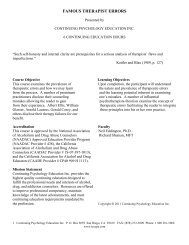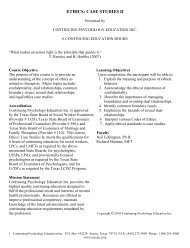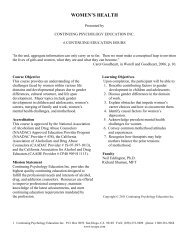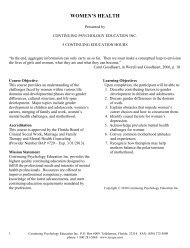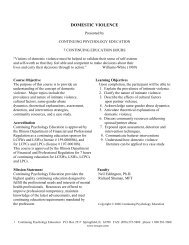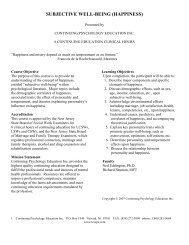subjective well-being (happiness) - Continuing Psychology Education
subjective well-being (happiness) - Continuing Psychology Education
subjective well-being (happiness) - Continuing Psychology Education
You also want an ePaper? Increase the reach of your titles
YUMPU automatically turns print PDFs into web optimized ePapers that Google loves.
SUBJECTIVE WELL-BEING (HAPPINESS)<br />
Presented by<br />
CONTINUING PSYCHOLOGY EDUCATION INC.<br />
2 CONTINUING EDUCATION HOURS<br />
“Happiness and misery depend as much on temperament as on fortune.”<br />
Francois de la Rochefoucauld, Maximes<br />
Course Objective<br />
The purpose of this course is to provide an<br />
understanding of the concept of <strong>happiness</strong>,<br />
entitled “<strong>subjective</strong> <strong>well</strong>-<strong>being</strong>” within<br />
psychological literature. Major topics include<br />
the demographic correlates of <strong>happiness</strong>,<br />
associated traits, the effect of personality and<br />
temperament, and theories explaining personality’s<br />
influence on <strong>happiness</strong>.<br />
Approval<br />
<strong>Continuing</strong> <strong>Psychology</strong> <strong>Education</strong> Inc. (CPE Inc.)<br />
is an NBCC-Approved <strong>Continuing</strong> <strong>Education</strong><br />
Provider (ACEP) and may offer NBCC-approved<br />
clock hours for events that meet NBCC requirements.<br />
The ACEP solely is responsible for all aspects of the<br />
program.<br />
<strong>Continuing</strong> <strong>Psychology</strong> <strong>Education</strong> Inc. awards 2<br />
NBCC-approved continuing education clock hours<br />
for completion of this program<br />
(NBCC Approved Provider # 6084).<br />
Mission Statement<br />
<strong>Continuing</strong> <strong>Psychology</strong> <strong>Education</strong> provides the<br />
highest quality continuing education designed to<br />
fulfill the professional needs and interests of mental<br />
health professionals. Resources are offered to<br />
improve professional competency, maintain<br />
knowledge of the latest advancements, and meet<br />
continuing education requirements mandated by<br />
the profession.<br />
Learning Objectives<br />
Upon completion, the participant will be able to:<br />
1. Describe major components and specific<br />
elements of <strong>happiness</strong>.<br />
2. Discuss demographic effects, such as sex,<br />
age, income, education, etc., upon<br />
<strong>subjective</strong> <strong>well</strong>-<strong>being</strong>.<br />
3. Acknowledge environmental effects<br />
including marriage, job satisfaction, health,<br />
leisure, competencies, etc., upon <strong>happiness</strong>.<br />
4. Understand cause, predictors ,and<br />
correlates of <strong>happiness</strong>, and accompanying<br />
theoretical justification.<br />
5. Explain key personality traits which<br />
promote greater <strong>well</strong>-<strong>being</strong>, such as<br />
extroversion, optimism, self-esteem, etc.<br />
6. Determine personality and temperament<br />
effects on <strong>happiness</strong>.<br />
7. Discuss the relationship between<br />
personality and <strong>happiness</strong>.<br />
Faculty<br />
Neil Eddington, Ph.D.<br />
Richard Shuman, MFT<br />
Copyright © 2006 <strong>Continuing</strong> <strong>Psychology</strong> <strong>Education</strong> Inc.<br />
1 <strong>Continuing</strong> <strong>Psychology</strong> <strong>Education</strong> Inc. P.O. Box 9659 San Diego, CA 92169 FAX: (858) 272-5809 phone: 1 800 281-5068<br />
www.texcpe.com
INTRODUCTION<br />
<br />
<br />
<br />
<br />
<br />
<br />
<br />
<br />
<br />
<br />
<br />
<br />
<br />
<br />
<br />
<br />
<br />
<br />
<br />
<br />
<br />
<br />
<br />
<br />
<br />
<br />
<br />
<br />
<br />
<br />
<br />
<br />
<br />
<br />
<br />
<br />
<br />
<br />
<br />
<br />
<br />
<br />
<br />
<br />
<br />
<br />
<br />
<br />
<br />
COMPONENTS OF SUBJECTIVE<br />
WELL-BEING
CAUSES AND CORRELATES OF HAPPINESS
CAUSES AND CORRELATES OF HAPPINESS
CAUSES AND CORRELATES OF HAPPINESS
CAUSES AND CORRELATES OF HAPPINESS
TRAITS ASSOCIATED WITH SWB
TRAITS ASSOCIATED WITH SWB
PERSONALITY AND SWB<br />
<br />
<br />
<br />
<br />
<br />
<br />
<br />
<br />
<br />
<br />
<br />
<br />
<br />
<br />
<br />
<br />
<br />
<br />
<br />
<br />
<br />
<br />
<br />
<br />
<br />
<br />
<br />
<br />
<br />
<br />
<br />
<br />
<br />
<br />
<br />
<br />
<br />
<br />
<br />
<br />
<br />
<br />
<br />
<br />
<br />
<br />
<br />
<br />
<br />
<br />
<br />
<br />
<br />
<br />
<br />
<br />
<br />
<br />
<br />
<br />
<br />
<br />
<br />
<br />
<br />
<br />
<br />
<br />
<br />
<br />
<br />
TEMPERAMENT EFFECTS ON SWB
THEORIES EXPLAINING PERSONALITY’S<br />
INFLUENCE ON SWB
THEORIES EXPLAINING PERSONALITY’S<br />
INFLUENCE ON SWB
CONCLUSION<br />
<br />
<br />
<br />
<br />
<br />
<br />
<br />
<br />
<br />
<br />
<br />
<br />
<br />
<br />
<br />
<br />
<br />
<br />
<br />
<br />
<br />
<br />
<br />
<br />
<br />
<br />
<br />
<br />
<br />
<br />
REFERENCES<br />
<br />
<br />
Youth and Society<br />
The <strong>Psychology</strong> of Social Class<br />
The Social <strong>Psychology</strong> of Leisure<br />
<br />
Well-<strong>being</strong>The foundations of hedonic<br />
psychology<br />
<br />
<br />
<br />
Personality and<br />
Individual Differences<br />
<br />
<br />
Stress and emotion<br />
<br />
<br />
<br />
<strong>Psychology</strong> and Aging<br />
Older and Active: How Americans over 55 are<br />
contributing to society.<br />
<strong>Psychology</strong> of physical activity and<br />
exercise.<br />
The structure of psychological <strong>well</strong>-<strong>being</strong>.<br />
<br />
<br />
Personality and Individual Differences<br />
<br />
<br />
<strong>Psychology</strong> and Aging<br />
<br />
<br />
Journal of Vocational Behavior,<br />
<br />
Journal Of Personality and<br />
Social <strong>Psychology</strong>,<br />
<br />
<strong>Psychology</strong> and Aging.<br />
The sense of <strong>well</strong>-<strong>being</strong> in America: Recent<br />
patterns and trends<br />
The quality of<br />
American life<br />
<br />
Personality and Social <strong>Psychology</strong> Bulletin,<br />
<br />
The pattern of Human Concerns.<br />
<br />
The positive externalities of higher<br />
employment: Evidence from household data.<br />
<br />
<br />
Family Relations,<br />
<br />
<br />
<br />
<br />
<br />
<br />
Journal of Personality and Social <strong>Psychology</strong>,<br />
<br />
<br />
Journal of Personality and Social<br />
<strong>Psychology</strong>,<br />
<br />
<br />
British Journal of <strong>Psychology</strong>,<br />
<br />
Can money buy <strong>happiness</strong>?<br />
<br />
The psychology of optimal<br />
experience,<br />
Optimal<br />
experience.<br />
<br />
<br />
Science
Psychological Bulletin,<br />
Psychological Bulletin,<br />
<br />
<br />
Advanced<br />
personality<br />
<br />
Journal of Personality and Social<br />
<strong>Psychology</strong><br />
<br />
Journal of Personality and Social<br />
<strong>Psychology</strong><br />
<br />
<br />
<br />
<br />
Social Indicators research,<br />
<br />
<br />
Journal of Personality and Social <strong>Psychology</strong>,<br />
<br />
<br />
Journal of Personality and Social <strong>Psychology</strong>,<br />
<br />
Well-<strong>being</strong>:<br />
The foundations of Hedonic <strong>Psychology</strong><br />
<br />
<br />
Developmental <strong>Psychology</strong>,<br />
<br />
<br />
Subjective <strong>well</strong>-<strong>being</strong><br />
<br />
<br />
<br />
Journal of Research in Personality<br />
<br />
<br />
Social Indicators Research,<br />
<br />
Social Indicators Research,<br />
<br />
Annual Review of Gerontology and Geriatrics,<br />
<br />
<br />
Psychological Bulletin,<br />
<br />
<br />
Journal of Personality and Social<br />
<strong>Psychology</strong>,<br />
<br />
Journal of Health and Social Behavior,<br />
<br />
Social Forces,<br />
<br />
<br />
Journal of Personality and Social <strong>Psychology</strong>,<br />
<br />
<br />
<br />
Personality and Individual Differences,<br />
Mediating the relations between goals and <strong>subjective</strong><br />
<strong>well</strong>-<strong>being</strong>: Global and domain-specific variants of self-efficacy.<br />
<br />
<br />
<br />
<br />
<br />
<br />
<br />
<br />
Journal<br />
of Personality and Social <strong>Psychology</strong>,<br />
<br />
<br />
Personality and Individual Differences,<br />
<br />
International Journal of Aging and<br />
Human Development,<br />
<br />
Sociology and Social Research,<br />
<br />
<br />
Journal of Marriage and Family<br />
Relations,<br />
<br />
Social Forces<br />
<br />
<br />
Advances in developmental<br />
psychology<br />
<br />
<br />
<br />
<br />
Behavioral Assessment,<br />
<br />
<br />
Journal of Health and Social Behavior,<br />
<br />
Journal of Family Issues<br />
<br />
<br />
<br />
<br />
Neurobiology of learning, emotion, , and affect<br />
<br />
<br />
Journal<br />
of Marriage and the Family<br />
<br />
Social Indicators Research,<br />
<br />
Social Indicators Research,<br />
<br />
<br />
Journal of Personality<br />
and Social <strong>Psychology</strong>,<br />
Understanding <strong>happiness</strong>: A theory of<br />
<strong>subjective</strong> <strong>well</strong>-<strong>being</strong><br />
<br />
The Journal of Comparative Social<br />
Science<br />
<br />
Research on Aging,<br />
<br />
Social Indicators Research,<br />
Culture shift in advanced industrial society.<br />
<br />
Galens prophecy.<br />
Birth to maturity.<br />
<br />
<br />
Current Directions in Psychological Science,
Journal of Behavioral Medicine,<br />
<br />
<br />
<br />
Advances in quality of life theory and research.<br />
<br />
<br />
Journal of<br />
Personality and Social <strong>Psychology</strong>,<br />
<br />
<br />
Personality and Social <strong>Psychology</strong> Bulletin<br />
<br />
Social Forces<br />
<br />
Journal of Social and Personal Relationships,<br />
<br />
<br />
<br />
<br />
<br />
Leisure and the quality of<br />
life.<br />
<br />
<br />
Journal of Marriage and Family Relations,<br />
<br />
<br />
Journal of Personality and Social <strong>Psychology</strong>,<br />
<br />
<br />
<br />
Perspectives on behavioral inhibition<br />
<br />
<br />
Journal of Gerontology,<br />
<br />
Developmental<br />
Review,<br />
<br />
Journal of Marriage<br />
and the Family<br />
<br />
<br />
<br />
<br />
<br />
Temperament and personality development across the life span<br />
<br />
<br />
Cross-cultural evidence for the fundamental features of extroversion:<br />
The case against sociability<br />
<br />
<br />
Journal of Personality and Social <strong>Psychology</strong>,<br />
<br />
<br />
Psychological Science,<br />
<br />
<br />
<br />
<br />
<br />
<br />
Child Development,<br />
<br />
<br />
<br />
<br />
Journal of<br />
Community and Applied Social <strong>Psychology</strong>,<br />
<br />
<br />
Journal of Personality and Social <strong>Psychology</strong>,<br />
<br />
Rehabilitation<br />
<strong>Psychology</strong>,<br />
Psychological<br />
Science,<br />
Global report on student <strong>well</strong>-<strong>being</strong>.<br />
<br />
<br />
Sociological Quarterly,<br />
<br />
Is a longer life better?: Happiness<br />
of the very old in 8 EU-countries.<br />
<br />
<br />
Personality and Individual Differences,<br />
Economic<br />
Journal<br />
<br />
Personality and Individual Differences,<br />
<br />
Psychological Medicine<br />
<br />
Journal of Health and Social Behavior<br />
<br />
Journal of<br />
<strong>Psychology</strong> and Theology,<br />
<br />
<strong>Psychology</strong> and<br />
Aging,<br />
<br />
<br />
Journal of Consumer Research,<br />
<strong>Psychology</strong> Today,<br />
<br />
<strong>Psychology</strong> and Aging,<br />
Social support: Theory,<br />
research, and applications<br />
<br />
<br />
Health <strong>Psychology</strong>,<br />
<br />
Current Directions in Psychological<br />
Science,<br />
<br />
Journal of<br />
Personality and Social <strong>Psychology</strong>,<br />
<br />
Experiencing emotion.<br />
<br />
<br />
Subjective <strong>well</strong>-<strong>being</strong>: An interdisciplinary<br />
perspective<br />
The joyless economy: An inquiry into human<br />
satisfaction and consumer dissatisfaction.<br />
<br />
<br />
<br />
Journal of Personality and Social <strong>Psychology</strong>,<br />
Coping with an undesirable life event: A study<br />
of early reactions to physical disability<br />
<br />
The pools winners
Journal of Behavioral Medicine,<br />
<br />
<br />
Evaluation studies: Review annual<br />
<br />
<br />
<br />
Experimental Aging Research,<br />
<br />
<br />
Journals of Gerontology:<br />
Series B. Psychological Sciences and Social Sciences,<br />
<br />
Journal of Personality and<br />
<br />
<br />
<br />
<br />
Journal of Applied <strong>Psychology</strong>,<br />
<br />
Review of Religious Research,<br />
<br />
<br />
Journal of Personality,<br />
<br />
Psychological<br />
Bulletin,<br />
<br />
<br />
Journal of Personality and Social <strong>Psychology</strong>,<br />
<br />
<br />
<br />
American Journal of Psychiatry,<br />
<br />
Conditions of <strong>happiness</strong><br />
<br />
<br />
from 603 studies in 69 nations:<br />
<br />
World database of<br />
<strong>happiness</strong>: Correlates of <strong>happiness</strong>.<br />
<br />
<br />
Psychological<br />
Bulletin,<br />
<br />
<br />
Handbook of personality psychology<br />
<br />
<br />
Journal of<br />
Personality and Social <strong>Psychology</strong>,<br />
<br />
European Journal of<br />
<br />
<br />
Journal of Family Issues,<br />
<br />
<strong>Education</strong><br />
Evaluation and Policy Analysis
SUBJECTIVE WELL-BEING<br />
TEST - SUBJECTIVE WELL-BEING<br />
2 <strong>Continuing</strong> <strong>Education</strong> Hours<br />
Record your answers on the Answer Sheet (click<br />
the “NCC Answer Sheet” link on Home Page<br />
and either click, pencil or pen your answers).<br />
Passing is 70% or better.<br />
For True/False questions: A = True and B = False.<br />
TRUE/FALSE<br />
1. Subjective <strong>well</strong>-<strong>being</strong> (SWB) is the psychological term<br />
for <strong>happiness</strong>.<br />
A) True B) False<br />
2. SWB research only studies negative psychological<br />
states such as sadness and fear.<br />
A) True B) False<br />
3. Personality strongly influences <strong>happiness</strong>.<br />
A) True B) False<br />
4. Demographic and environmental factors affect<br />
<strong>happiness</strong> to a lesser degree than personality.<br />
A) True B) False<br />
5. Life satisfaction does not decline with age.<br />
A) True B) False<br />
6. The effects of income on <strong>happiness</strong> are small<br />
even when examining extremely wealthy<br />
individuals.<br />
A) True B) False<br />
7. Married people report greater <strong>happiness</strong> compared<br />
to those who were never married or are divorced.<br />
A) True B) False<br />
8. Work is thought to be related to SWB because it<br />
offers stimulation, positive social relationships, and<br />
a sense of identity and meaning.<br />
A) True B) False<br />
9. Sports and exercise increase <strong>happiness</strong> partly due to<br />
the release of endorphins, social interaction, and the<br />
experience of success or self-efficacy.<br />
A) True B) False<br />
10. Social-skills have NO influence upon <strong>happiness</strong>.<br />
A) True B) False<br />
<strong>Continuing</strong> <strong>Psychology</strong> <strong>Education</strong> Inc. (CPE Inc.) is an<br />
NBCC-Approved <strong>Continuing</strong> <strong>Education</strong> Provider (ACEP)<br />
and may offer NBCC-approved clock hours for events that<br />
meet NBCC requirements. The ACEP solely is responsible for<br />
all aspects of the program.<br />
<strong>Continuing</strong> <strong>Psychology</strong> <strong>Education</strong> Inc. awards 2<br />
NBCC-approved continuing education clock hours for<br />
completion of this program<br />
(NBCC Approved Provider # 6084).<br />
11. Being extroverted, which correlates with positive<br />
affect (moods and emotions) and <strong>happiness</strong>, includes<br />
characteristics of stimulus seeking, warmth,<br />
high activity, and _______________.<br />
A) irritability<br />
B) anxiety<br />
C) sociability<br />
D) unpleasant thoughts<br />
12. Neuroticism, which correlates highly with negative<br />
affect (moods and emotions) and low levels of<br />
<strong>happiness</strong>, includes characteristics of __________.<br />
A) anxiety<br />
B) pessimism<br />
C) irritability<br />
D) all of the above<br />
13. Many researchers believe that marriage correlates<br />
with <strong>happiness</strong> because it _______________.<br />
A) buffers against the hardships of life<br />
B) provides emotional support<br />
C) provides economic support<br />
D) all of the above<br />
14. The life event rated highest for producing <strong>happiness</strong><br />
is ___________________.<br />
A) finding a job<br />
B) falling in love<br />
C) work promotion<br />
D) finding a new friend<br />
15. In America, self-esteem correlates with <strong>happiness</strong><br />
______________.<br />
A) strongly<br />
B) weakly<br />
C) not at all<br />
D) as a negative correlation<br />
16 <strong>Continuing</strong> <strong>Psychology</strong> <strong>Education</strong> Inc.
. The effect of biologically based temperament<br />
upon <strong>happiness</strong> is ________________.<br />
<br />
<br />
<br />
<br />
<br />
. Intrinsic goals which satisfy inherent psychological<br />
needs are considered more relevant<br />
than extrinsic goals, hence, the pursuit of material<br />
goods should affect <strong>happiness</strong> ______________.<br />
<br />
<br />
<br />
<br />
The important factors in determining <strong>happiness</strong><br />
are _____________________.<br />
<br />
<br />
<br />
<br />
<br />
The lack of significant decrease in life satisfaction<br />
across the life span suggests _______________.<br />
<br />
<br />
<br />
<br />
<br />
. Those who believe that positive outcomes<br />
will follow working toward a goal (which<br />
tends to improve chances of goal-attainment and<br />
<strong>happiness</strong>) are called _______________.<br />
<br />
<br />
<br />
<br />
<br />
<br />
<br />
<br />
<br />
<br />
<br />
<br />
<br />
<br />
<br />
Copyright © 2006 <strong>Continuing</strong> <strong>Psychology</strong> <strong>Education</strong>


